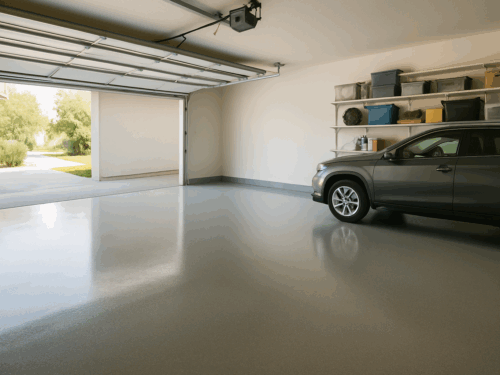
How Long Does Epoxy Flooring Last? A Complete Lifespan Guide
If you’re considering installing epoxy flooring, one of the first questions that probably comes to mind is: how long does epoxy floor last? The answer depends on where it’s installed, how it’s maintained, and the quality of the materials used.
In this post, we’ll break down what affects epoxy floor lifespan, give real-world examples, and explain how to extend its durability — so you can make the most of your investment.
What Is Epoxy Flooring?
Epoxy flooring is a resin-based coating applied over concrete surfaces to create a seamless, durable, and often glossy finish. It’s used in everything from garages and warehouses to retail stores and commercial kitchens.
For a deep dive on the basics, check out our article: What Is Epoxy Flooring?
Average Epoxy Floor Lifespan
On average, an epoxy floor can last:
- 2–3 years in high-traffic commercial or industrial settings
- 5–10 years in residential garages or basements
- 10+ years with proper maintenance and minimal wear
The range is broad because epoxy durability depends heavily on use, prep work, and environmental conditions.
What Impacts How Long an Epoxy Floor Lasts?
1. Traffic Load
Heavy use—like forklifts in a warehouse or constant vehicle movement in a garage—can wear down the surface faster.
2. Installation Quality
If the concrete wasn’t properly prepped (cleaned, leveled, and etched), the epoxy might not adhere well. That can lead to early peeling or bubbling.
3. UV Exposure
Standard epoxy isn’t UV-stable. If exposed to sunlight, it may yellow or degrade faster. For sunlit areas, a UV-resistant topcoat is essential.
4. Moisture and Substrate Movement
Moisture vapor rising from the concrete slab or foundation shifts can cause cracks, bubbles, or delamination.
5. Type of Epoxy System
- Basic DIY kits may only last 1–3 years
- Professional-grade multi-coat systems can last 7–15 years
Epoxy Lifespan by Location
| Location | Typical Lifespan | Notes |
|---|---|---|
| Residential Garage | 5–10 years | Subject to tire wear and oil stains |
| Basement | 10+ years | Low-traffic, controlled environment |
| Commercial Kitchen | 3–5 years | Hot grease, chemicals, and cleaning stress |
| Warehouse | 2–3 years | Forklifts and heavy machinery cause faster wear |
How to Extend the Life of Your Epoxy Floor
- Keep it clean: Regular sweeping and light mopping prevent abrasive particles from scratching the surface.
- Use protective mats: Place mats or pads under heavy equipment or vehicle tires.
- Reseal as needed: A fresh topcoat every few years can refresh shine and add protection.
- Fix issues early: Address cracks, peeling, or bubbling as soon as you spot them to avoid deeper damage.
Signs Your Epoxy Floor Is Wearing Out
- Loss of shine or discoloration
- Visible scratches or surface gouges
- Delamination (coating peeling from the concrete)
- Staining that doesn’t clean up easily
In most cases, a worn epoxy floor doesn’t need to be completely removed — it can be cleaned, re-etched, and recoated to restore its function and appearance.
Is Epoxy Worth It Long-Term?
While epoxy isn’t the best choice for every environment, its long lifespan — especially in residential spaces — makes it a cost-effective upgrade for concrete floors.
It may not offer the warmth or natural feel of wood-look vinyl or engineered hardwood (see Kid‑Friendly Flooring That Still Looks Grown‑Up), but when it comes to durability, cleanability, and visual impact, epoxy floors hold their own.
Final Thoughts
So how long does epoxy floor last? In the right setting, with good prep and proper care, epoxy flooring can easily serve you for up to a decade — or more.
If you’re weighing your options between epoxy and more traditional residential flooring, check out our blog for practical comparisons and insights. At Walk The Plank Flooring, we believe informed homeowners make the best flooring choices — whether or not we install it ourselves.
Want more floor life hacks and real-world guides? Visit the Walk The Plank blog for inspiration, how-tos, and helpful tips.


